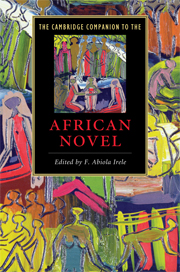Book contents
- Frontmatter
- 1 Introduction: perspectives on the African novel
- 2 The oral-literate interface
- 3 Chinua Achebe and the African novel
- 4 Protest and resistance
- 5 The Afrikaans novel
- 6 The African novel in Arabic
- 7 The francophone novel in North Africa
- 8 The francophone novel in sub-Saharan Africa
- 9 The African historical novel
- 10 Magical realism and the African novel
- 11 The African novel and the feminine condition
- 12 Autobiography and Bildungsroman in African literature
- 13 The postcolonial condition
- 14 New voices, emerging themes
- 15 The critical reception of the African novel
- Bibliography
- Index
4 - Protest and resistance
Published online by Cambridge University Press: 28 January 2010
- Frontmatter
- 1 Introduction: perspectives on the African novel
- 2 The oral-literate interface
- 3 Chinua Achebe and the African novel
- 4 Protest and resistance
- 5 The Afrikaans novel
- 6 The African novel in Arabic
- 7 The francophone novel in North Africa
- 8 The francophone novel in sub-Saharan Africa
- 9 The African historical novel
- 10 Magical realism and the African novel
- 11 The African novel and the feminine condition
- 12 Autobiography and Bildungsroman in African literature
- 13 The postcolonial condition
- 14 New voices, emerging themes
- 15 The critical reception of the African novel
- Bibliography
- Index
Summary
“I had no idea of the conditions, he said: these heads were the heads of rebels. I shocked him excessively by laughing. Rebels! What would be the next definition I was to hear. There had been enemies, criminals, workers – and these were – rebels. Those rebellious heads looked very subdued to me on their sticks.” Joseph Conrad, Heart of Darkness (1898) / Surrounding Kurtz’s compound, much to the “horror” of Marlow, is a stockade impaling native heads. Marlow, Conrad’s less-than-reliable narrator in Heart of Darkness, had been brought to the site by Kurtz’s “admirer,” the ship’s-log-reading Russian harlequin. The exchange between the two disparately attired and differently attached, albeit interest-sharing, pursuers of Kurtz exposes, however, the lurking possibilities in the situation itself for a mobilized, organized African resistance against the European imperial project: “I had no idea of the conditions, he [Kurtz’s admirer] said: these heads were the heads of rebels.” And Marlow responds: “I shocked him excessively by laughing. Rebels! What would be the next definition I was to hear. There had been enemies, criminals, workers – and these were – rebels. Those rebellious heads looked very subdued to me on their sticks.” Subdued perhaps, even dead, impaled on sticks surrounding the compound of the nineteenth-century imperial representative feared to have “gone native,” but representing nonetheless the momentous makings of twentieth-century protest and organized resistance to come: enemies, yes; criminals, depending on whose law and order; workers, indeed. Rebels. Whether the recent history of the African novel as geopolitical genre is itself a narrative of protest and resistance remains a matter of debate.
- Type
- Chapter
- Information
- The Cambridge Companion to the African Novel , pp. 51 - 68Publisher: Cambridge University PressPrint publication year: 2009

